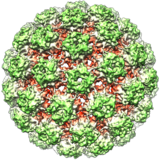Portal:Viruses/Selected virus/6
Papillomaviruses are small non-enveloped DNA viruses that make up the Papillomaviridae family. Their circular double-stranded genome is around 8000 nucleotides long. The icosahedral capsid is 55–60 nm in diameter. They infect humans, other mammals and some other vertebrates including birds, snakes, turtles and fish. Around a hundred species are classified into 53 genera. All papillomaviruses replicate exclusively in epithelial cells of stratified squamous epithelium, which forms the skin and some mucosal surfaces, including the lining of the mouth, airways, genitals and anus.
Infection by most papillomaviruses is either asymptomatic or causes small benign tumours known as warts or papillomas. Francis Peyton Rous showed in 1935 that the Shope papilloma virus could cause skin cancer in rabbits – the first time that a virus was shown to cause cancer in mammals – and papillomas caused by some virus types, including human papillomavirus 16 and 18, carry a risk of becoming cancerous if the infection persists. Papillomaviruses are associated with cancers of the cervix, vulva, vagina, penis, oropharynx and anus in humans.

